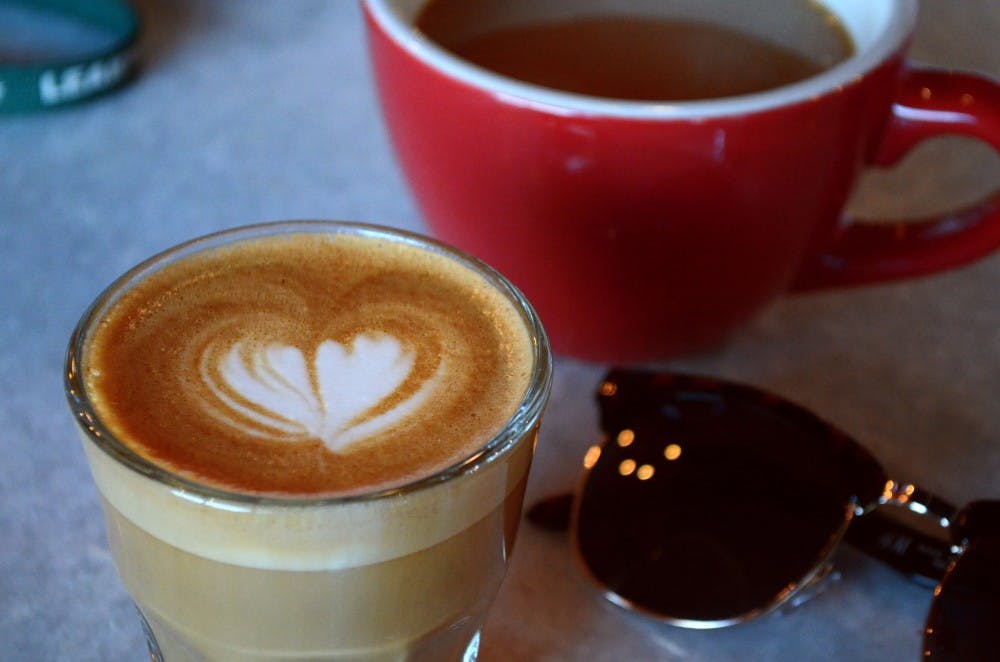Driving through downtown Graham, almost impossible to miss Press Coffee+Crepes. The exterior of the coffee and crepes shop pops out with dark blue paint, a contrast to the pastel facades that line the rest of North Main Street.
The interior is just as different — quiet indie music, stone tables, reclaimed wooden chairs and exposed brick walls, all lit with bare lightbulbs hanging on burnished copper wires from the black tiled ceiling. Menus are printed on card stock and clipped to clipboards, and baristas wear denim aprons.
Head barista Alice Bailey said that, to her surprise, the people of Graham like the difference.
“It’s an insane risk, and it’s great when you have people coming into your place and thanking you for opening,” she said.
Bailey said she was nervous the Graham community wouldn’t appreciate a coffee shop like Press moving in alongside the rest of the “Southern charm” on Main Street. But a unique community came rolling in.
“It’s the most diverse crowd I’ve ever seen at a coffee shop, and it’s so unexpected,” she said. “It was just immediate — a lot of curiosity, a lot of will to experiment and go out on a limb for people who may have otherwise been intimidated by foreign food.
“There’s coffee from different places, and you have to keep in mind that, for some people, crepes are scary.”
Press offers a variety of sweet and savory crepes — including the “Sweet Granny,” filled with green apples and caramel sauce and topped with powdered sugar, and the “Herbivore,” stuffed with a mix of vegetables and served with a choice of house seasoning.
Crepes run about $6-$8, with an extra $2 charge for a gluten-free buckwheat crepe shell. Those with allergies should be careful to be clear when ordering, though.
A member of ENN staff who has a gluten allergy was served a regular crepe when she ordered a gluten-free one. Press remade the crepe at no extra cost.
The creperie also offers a long list of coffees and teas, both hot and iced.

Janice Murphy and her daughter Riki McGee said they had come to Press for the first time to try out a new breakfast spot in the area, and they were already impressed by the iced coffee and the decor.
“I see the new sign every day as I drive by, and then someone I clean houses for told me I should come,” Murphy said. “I like that they’re going back to the old stuff — the rustic look.”
It’s possible that the “reclaimed” aesthetic is what makes Press’ ambitiously different decor work. Though it’s different, it’s familiar in a way— especially to Southerners.
Take the small, ceramic bathtub Press sets out for customers to return their used coffee and tea mugs. Someone from a bigger city in the North might see the wash bin as part of a recent trend toward deceptively expensive, intentionally quirky, self-aware and eclectic decorations — think the home section of Urban Outfitters.
But as a small-town Southerner myself, I see a well-repurposed hand-me-down that adds charm in a practical way, and I appreciate it so much more than a plastic bin because it seems respectful and practical at the same time.
The inspiration for the reclaimed aesthetic, according to Bailey, was the wall behind the bar, discovered when Press’s Founder’s father tore down the drywall that was here when Press moved in.

“What they had found was that wall, which was about 120 years of sedimented paint,” Bailey said. “Up close, it looks so rad. It’s got these chartreuse drips and all these different colors.”
With about 20 patrons already keeping the small staff of baristas busy at 9 a.m. on a Monday, it seems Graham also thinks the wall, and the coffee shop, are pretty rad.


